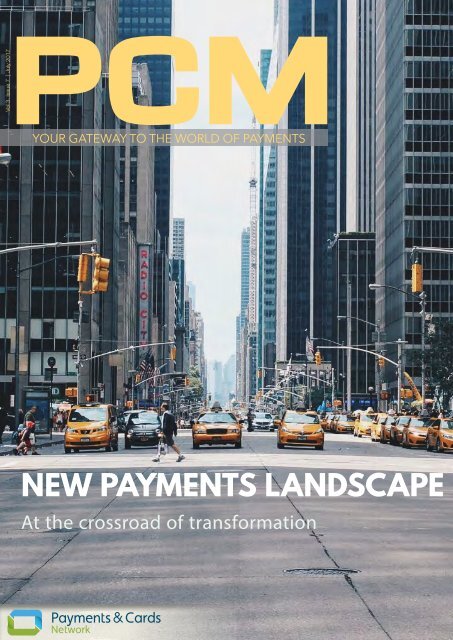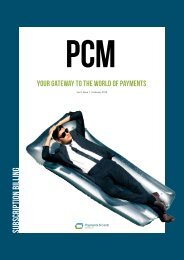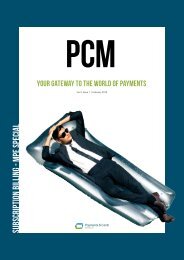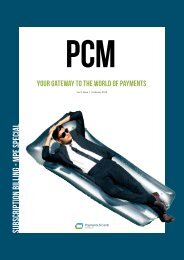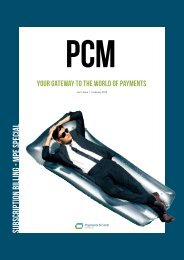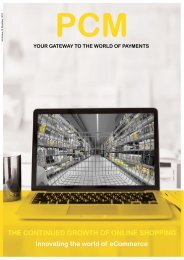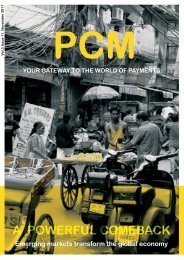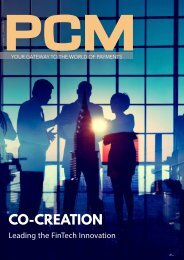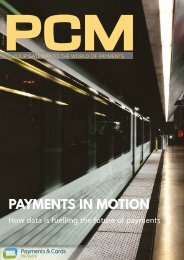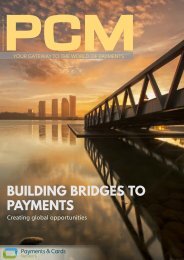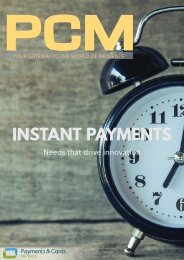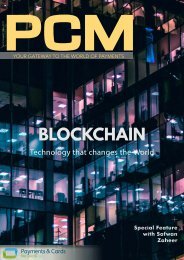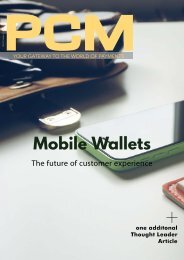PCM vol. 3 issue 7
The seventh issue of the Payments & Cards eMagazine \"PCM\". In this issue, we look at the global payments landscape including critical developments, challenges & opportunities. Contributions from Holland Fintech, AltaPay, Metro Atlanta Chamer + Fintech Atlanta, EBANX, Countr POS and OLX Group.
The seventh issue of the Payments & Cards eMagazine \"PCM\". In this issue, we look at the global payments landscape including critical developments, challenges & opportunities. Contributions from Holland Fintech, AltaPay, Metro Atlanta Chamer + Fintech Atlanta, EBANX, Countr POS and OLX Group.
Create successful ePaper yourself
Turn your PDF publications into a flip-book with our unique Google optimized e-Paper software.
Vol 3. Issue 7 | July 2017<br />
YOUR GATEWAY TO THE WORLD OF PAYMENTS<br />
NEW PAYMENTS LANDSCAPE<br />
At the crossroad of transformation
MAXIMIZE<br />
YOUR DATA<br />
VALUE<br />
THE LEADING SOURCE FOR DATA SCIENTISTS IN PAYMENTS<br />
CONTACT US NOW<br />
Having data dilemmas? Please contact: simon@digitalsource.io<br />
Digital Source | Herengracht 576 | 1017 CJ | Amsterdam | The Netherlands | +31 (0) 202 373 639
Contents<br />
STORIES<br />
Amir Abdin<br />
Founder & Editor-in-Chief<br />
amir@teampcn.com<br />
https://nl.linkedin.com/in/amir-abdin-21365683<br />
4<br />
8<br />
11<br />
15<br />
The rise of a new FinTech hub & talent magnet in the<br />
South of the U.S.<br />
To go big in Latin America, you better understand<br />
local payment methods<br />
Omni-channel or Multi-channel Payments in a<br />
Cross-Border POS Environment?<br />
Repainting the payments landscape with Don<br />
Ginsel<br />
18<br />
Start-up Spotlight: Countr<br />
21<br />
Unlocking potential in high-growth markets<br />
Duc Dang<br />
Production Editor & Head of Creative<br />
duc@teampcn.com<br />
https://nl.linkedin.com/in/ducdanghh<br />
24<br />
25<br />
Hot Jobs<br />
Industry Events Calendar<br />
THANKS TO OUR PARTNERS<br />
<strong>PCM</strong> is designed by Duc Dang, Payments & Cards Network. Art and<br />
photos © Payments & Cards Network, picjumbo.com, Flickr.com and<br />
Shutterstock.com, excluding advertisments and company logos.<br />
<strong>PCM</strong> is property of Payments & Cards Network, Herengracht 576,<br />
2nd Fl., 1017 CJ, Amsterdam, The Netherlands. All material contained<br />
within <strong>PCM</strong> is the property of Payments & Cards Network. All other<br />
product and service names may be trademarks of their respective<br />
companies. ©2017 Payments & Cards Network. All rights reserved.<br />
Reproduction of any kind is strictly prohibited without express prior<br />
written consent of Payments & Cards Network.<br />
ADVERTISING INFORMATION<br />
For details, please contact amir@teampcn.com<br />
3
Thought Leaders Corner<br />
The rise of a new FinTech hub & talent<br />
magnet in the South of the U.S.<br />
by Grant Wainscott & Barry McCarthy<br />
Atlanta has historically been recognized for its<br />
transportation systems. Centuries ago, the city was<br />
known for its railroads, and that legacy continues<br />
today with the city serving as home to the busiest<br />
airport in the world.<br />
However, what people do not always immediately realize about<br />
Atlanta is that it has quietly become a global FinTech capital.<br />
There are more FinTech companies in Atlanta than anywhere<br />
else around the globe. Collectively, these organizations power<br />
70% of all U.S. credit, debit, and gift card transactions, securely<br />
handling tens of trillions of dollars each year on behalf of<br />
consumers and global businesses.<br />
In addition to First Data, Equifax, NCR, Global Payments, and<br />
others, there are more than 100 FinTech companies with major<br />
presence in the state, and companies in the state earn the third<br />
most annual revenue only behind New York and California.<br />
The presence of FinTech companies has been a point of<br />
emphasis for both the public and private sectors in the metro<br />
area. In collaboration with the Metro Atlanta Chamber of<br />
Commerce, the American Transaction Processors Coalition,<br />
and the Technology Association of Georgia, FinTech Atlanta<br />
was created to recruit, retain, and promote jobs and businesses<br />
across the FinTech industry.<br />
Four Georgia schools were ranked top universities by U.S. News<br />
& World Reports in 2016: Emory, Georgia Tech, Mercer, and<br />
University of Georgia. Additionally, five Georgia schools ranked<br />
among the best Historically Black Colleges and Universities<br />
with Morehouse College, Clark Atlanta University, Fort Valley<br />
State, and Savannah State University all making the list.<br />
Terrific talent is being developed in the state, and FinTech<br />
companies provide incredible opportunities to graduates.<br />
This also means that companies with presence in the area can<br />
foster relationships with top institutions to provide training<br />
curriculums and work alongside universities to prepare<br />
students with educational resources and skills relevant to the<br />
working world.<br />
As payments and financial technology are embedded into<br />
every company, the reach of the group extends beyond core<br />
payments providers. Exchanging funds for goods and services,<br />
commerce, is the foundation of the global economy. Every<br />
single business must accept and make payments, which is why<br />
FinTech Atlanta extends to also include Coca-Cola, Delta, The<br />
Home Depot, Bain & Co., among others.<br />
There is an abundance of opportunity for companies based in<br />
Georgia. Employees living here benefit from a moderate cost of<br />
living, access to good public schools, good year-round weather,<br />
more trees than any other U.S. city, close proximity to a global<br />
airport, renowned museums, and great sports teams.<br />
Additionally, in 2016, Georgia was ranked as the number one<br />
state to do business in for the fourth consecutive year by Site<br />
Selection magazine.<br />
4
Thought Leaders Corner<br />
Barry McCarthy<br />
EVP, Head of Network and Security Solutions at<br />
First Data<br />
Barry McCarthy serves as EVP, Head of Network and Security Solutions<br />
(NSS) at First Data. The $1.6 billion NSS segment includes all of the<br />
firm’s network, debit, prepaid, ACH/check, fraud, security, secure digital<br />
distribution, online and mobile banking, and government solutions.<br />
Barry is also the Chairman of FinTech Atlanta.<br />
Metro Atlanta is a world-class hub for technology design,<br />
implementation, and innovation.<br />
Powered by the strength of more than 13,000 technology<br />
companies, the region is lauded for its strengths in Smart<br />
Cities/IoT, cybersecurity, FinTech, digital media, and a<br />
thriving mobility ecosystem. Metro Atlanta has created a<br />
robust talent pipeline unmatched in the region, leading<br />
to a dramatic increase in university and privately-funded<br />
accelerators and corporate innovation centers as companies<br />
seek to leverage top-notch students and faculty talent. As one<br />
of the fastest-growing, high-tech urban centers in the nation,<br />
leading the way in creating a national center for innovation<br />
and industry growth, metro Atlanta is a world-class hub for<br />
technology design, implementation, and innovation. In fact,<br />
Atlanta was recently named by CBRE as one of the top 10 tech<br />
talent markets in the nation.<br />
One of Georgia’s most important and fastest-growing industries<br />
is financial technology, or FinTech. On par with London, New<br />
York, Zurich and Singapore, metro Atlanta is quickly becoming<br />
a global center for money, markets and transactions. Our<br />
one-of-a-kind ecosystem includes global giants like First<br />
Data, Equifax, NCR, Worldpay, FIS, ICE, Sage and Global<br />
Payments, as well as today’s disrupters and entrepreneurs like<br />
Kabbage, Paymetric, Greensky, ControlScan, GroundFloor, and<br />
Cardlytics.<br />
FinTech in Georgia drives more than $30 billion in annual<br />
revenues, employs more than 40,000 people, and processed<br />
$5 trillion in transactions in 2015 alone. From Atlanta’s early<br />
days clearing check payments through the Federal Reserve,<br />
to the cutting-edge work being fostered at Georgia Tech’s<br />
Worldpay FinTech Accelerator program at the Advanced<br />
Technology Development Center, metro Atlanta and Georgia<br />
have consistently taken the lead in the development of new<br />
and innovative financial services.<br />
About First Data<br />
First Data (NYSE: FDC) is a global leader in commerceenabling<br />
technology and solutions, serving<br />
approximately six million business locations and<br />
4,000 financial institutions in more than 100 countries<br />
around the world. The company’s 24,000 ownerassociates<br />
are dedicated to helping companies, from<br />
start-ups to the world’s largest corporations, conduct<br />
commerce every day by securing and processing more<br />
than 2,800 transactions per second and $2.2 trillion<br />
per year.<br />
5
Thought Leaders Corner<br />
Grant Wainscott<br />
Senior Director, Technology Ecosystem Expansion at<br />
Metro Atlanta Chamber<br />
Grant Wainscott is the Senior Director of Technology Ecosystem<br />
Expansion for the Metro Atlanta Chamber and is charged with growing<br />
and promoting Atlanta’s FinTech & Cyber ecosystems around the world.<br />
He has deep experience in international trade and technology, and has<br />
lived and worked extensively in the US and abroad.<br />
Helping to feed the demand for this ready workforce are<br />
29 higher education institutions including four research<br />
universities, two of which rank among the top 25 national public<br />
colleges and universities. Rounding out the robust ecosystem<br />
are important efforts like the Technology Association of<br />
Georgia, American Transaction Processors Coalition and the<br />
FinTech Atlanta Task Force, as well as dozens of FinTech and<br />
related conferences, trade shows and meetups.<br />
In addition to providing comprehensive site selection<br />
consultation, MAC Global Commerce assists FOEs with their<br />
due diligence and connects them to the resources needed to<br />
avoid the missteps that some companies make entering the U.S.<br />
The Metro Atlanta Chamber (MAC) plays an important role<br />
in helping connect the numerous economic development<br />
partners like utility providers and state/local governments,<br />
with the ecosystem and industry leaders. From startups to<br />
our Fortune 500 community, our team understands global<br />
trade and our markets. In particular, with collective decades<br />
of international expertise, the Global Commerce team at MAC<br />
is in place specifically to help foreign-owned enterprises (FOEs)<br />
navigate the path for entry and expansion in the U.S. market.<br />
Metro Atlanta<br />
The Metro Atlanta Chamber is dedicated to leading our region<br />
to a more prosperous and vibrant future. Our focus is advancing<br />
economic growth, enhancing our business climate and improving<br />
the quality of life for each and every person who calls Atlanta home.<br />
Fintech Atlanta<br />
FinTech Atlanta is a coalition of companies (from Fortune 500s<br />
to startups) and organizations working to cement Atlanta as the<br />
recognized global capital of financial technology. The group’s<br />
priorities are to fund and fuel efforts to RECRUIT, RETAIN and<br />
EXPAND businesses and jobs across the FinTech ecosystem in<br />
metro Atlanta and the state of Georgia.<br />
6
LOOKING FOR A JOB?<br />
THERE’S NO BETTER WAY TO START YOUR CAREER IN PAYMENTS<br />
Sign-up for free<br />
www.payment.jobs<br />
www.payment.jobs
Thought Leaders Corner<br />
To go big in Latin America,<br />
you better understand local<br />
payment methods<br />
by Andre Allain<br />
For businesses looking to expand globally, Latin America<br />
must be a target market. The region is growing, society<br />
is ascending in economic power, and therefore avid to<br />
consume. Besides being the biggest country in Latin<br />
America, Brazil also dominates the cross-border market,<br />
followed by Mexico. Another country who is getting a lot of<br />
attention lately, Chile is receiving investments from China and<br />
within the next months will gain a branch of Bank of China,<br />
one of the four largest banks of the Asian Country, according<br />
to the Chilean newspaper La Tercera.<br />
An expanding middle class with an increasingly<br />
sophisticated taste<br />
Today Latin America is home to 600 million people. Almost<br />
one-third of it is formed by the middle class, people with an<br />
income of 4 to 50 dollars a day. This group has doubled in size<br />
during the last decade, according to a study released in 2016<br />
by the Inter-American Development Bank about the social<br />
conditions in Latin America and the Caribbean.<br />
This new middle class is an avid user of the internet, its<br />
consumption needs keep increasing in sophistication and<br />
remain unsatisfied by the local supply of goods and services,<br />
hence, turning to a more diverse global supply of goods and<br />
services via e-commerce.<br />
But these almost 200 million Latin Americans are not being<br />
served well enough when it comes to e-commerce. They want<br />
to buy from abroad but face the reality of a lack of payment<br />
options. The consumer has the eager and the money to buy,<br />
but can’t complete the purchase simply because the merchant<br />
does not accept the payment method that he or she is used to<br />
working with.<br />
Just like any other market, Latin America has its own<br />
specificities. The local payment methods are one of them.<br />
In order to have a successful entering and good penetration<br />
in the region, it is necessary to offer these local methods.<br />
You can’t access the whole Latin American market with just<br />
international acquirers.<br />
But what are these local payment methods?<br />
Credit cards are still the preferred payment method in Latin<br />
America. However, global merchants should expect a low<br />
credit card approval rate in Latin American countries in<br />
general. Let’s take a look at some data from Brazil and Mexico,<br />
the first and second largest region’s e-commerce markets.<br />
In Brazil, this rate is between 30% and 50%. The main cause of<br />
this low approval rate is the fact that internationally accepted<br />
credit cards (that can process in foreign currency) represent<br />
only 19% of the country’s digital payments market.<br />
It means that 81% of these Brazilian consumers cannot buy<br />
from global merchants if these merchants do not offer local<br />
payment methods. Local payment methods are local credit<br />
8
Thought Leaders Corner<br />
Andre Allain<br />
Head of Enterprise Sales at EBANX<br />
Andre is the head of Enterprise Sales at EBANX, leading the team<br />
through the expansion of EBANX current enterprise merchant base<br />
to Latin America and to add new enterprise merchants, helping<br />
businesses to overcome local barriers and reach the full potential<br />
of consumption in the region. He holds a Master of Business<br />
Administration from the University of Melbourne and has been working<br />
on the e-commerce and payments market for the last 10 years.<br />
cards (that only process BRL) such as Elo, Hipercard, local<br />
Visa, and local MasterCard, debit cards, bank transfer, and<br />
cash payments.<br />
A very well-known and familiar Brazilian cash payment<br />
method is the Boleto Bancário, or boleto for short. Millions<br />
of Brazilians are used to pay utility bills like water, electricity,<br />
rent, among others, with it. They are used to it and more<br />
important, they trust in it.<br />
One of the main reasons Brazilians prefer to pay using<br />
Boleto Bancário is the transparency of it. All the information<br />
needed is in one document, which includes the exact amount<br />
the customer will have to pay and by when, the barcode,<br />
corresponding serial number (that allows to pay it by using<br />
internet banking), issuing bank code, customer information,<br />
and description. The capillarity is another reason since the<br />
boleto can be paid in more than 64K different locations around<br />
the country such as supermarkets, lottery stores, and banks.<br />
Another common payment method in Brazil is bank transfer,<br />
or Electronic Funds Transfer. This method allows the<br />
consumer to pay by using its own online bank account, by<br />
being redirected to its bank website.<br />
In Mexico, for each credit card, there are 5 debit cards. OXXO,<br />
a cash payment alternative holds a 30% Mexican market share<br />
of online shopping. It is powered by the OXXO convenience<br />
stores chain. Like the Boleto Bancário in Brazil, OXXO is an<br />
extremely popular cash payment method in which Mexicans<br />
trust. They are used to it and can pay it in any one of the 14K<br />
OXXO convenience stores around the country.<br />
Besides Brazil and Mexico, e-commerce in Colombia is<br />
booming in the last three years (growth of 50% since 2013 to<br />
2016, according to American Market Intelligence), Colombians<br />
are increasingly buying from online stores and also looking for<br />
products and services provided by global merchants.<br />
As the numbers show, Latin American nations are growing<br />
fast as well as embracing the internet, social media, and<br />
e-commerce with open arms. But it is still a market that<br />
has very specific characteristics and needs. It is important<br />
for global merchants to trust and use partners that have:<br />
proven track record of success, understand the local culture,<br />
what does and doesn’t work and knows the behavior of local<br />
consumers.<br />
Latin America is a market to be unlocked.<br />
EBANX<br />
EBANX is a Brazilian Fintech that offers Latin American local<br />
payment methods to global businesses. The company provides<br />
solutions for merchants such as AliExpress, Airbnb, Spotify, Wish,<br />
and Udacity. EBANX is changing the way consumers in Brazil,<br />
Mexico, Colombia, Chile, and Peru pay on international websites and<br />
has already enabled more than 21 million people in these countries<br />
to access global products and services, as well as enabling global<br />
e-commerces to reach new audiences.<br />
Along these, there are the interest-free installments, or Meses<br />
Sin Intereses, a widely popular method in the country. A<br />
study released by AMIPCI (the Mexican Internet Association)<br />
indicates that 6 out of 10 e-commerce buyers would prefer to<br />
make an online purchase that offers interest-free installments,<br />
over a discount or free shipping.<br />
9
11 th Pan-European Conference in the P2P Series<br />
P2P and Robotic Process Automation<br />
Strategy Workshop<br />
Moving to the next level of maturity<br />
On a journey towards<br />
Straight-Through-Processing<br />
and Zero-Touch P2P<br />
12 th – 14 th September 2017 — Amsterdam, The Netherlands<br />
Attending this Premier marcus evans Conference<br />
will Enable You to<br />
• Benchmark experience on the journey towards Straight<br />
Through Processing and Zero-Touch P2P<br />
• Hear success stories on purchasing Master Data<br />
Management projects<br />
• Increase the Efficiency in SSC and improve the PO<br />
Compliance Rate<br />
• Get the Most out of Process Mining and Analytics<br />
Expert Speaker Panel Includes<br />
Henk Grol<br />
Global Manager P2P<br />
Liberty Global B.V.<br />
Lars J Andersson<br />
Head of Procurement Automation and Analytics<br />
A.P. Moller - Maersk Group<br />
Milena Galanciak-Nakouri<br />
P2P Systems<br />
Nordea<br />
Linde Penn-Dijkgraaf<br />
Global Process Owner PtP Express<br />
DP DHL<br />
Learn from Key Practical Case Studies<br />
• Maersk is transforming procurement and supply chain roles<br />
with robotics<br />
• From P2P to S2P to M2P: Master Data Management journey<br />
at Liberty Global<br />
• Invoice Management Journey: from Integrated to Cloud<br />
Solutions at HEINEKEN<br />
• Integrated Purchase to Pay process in Indirect Purchasing<br />
at Bosch<br />
• UPM sharing analytics and process mining approach<br />
and the journey/strive towards world-class P2P<br />
Lars Bulow<br />
Manager, Global Accounts Payable<br />
Financial Global Shared Services<br />
Cisco<br />
Business Development Opportunities<br />
Does your company have services, solutions or technologies that the<br />
conference delegates would benefit from knowing about? If so, you<br />
can find out more about the exhibiting, networking and branding<br />
opportunities available by contacting:<br />
Yiota Andreou, Digital Marketing & PR Executive,<br />
marcus evans Cyprus<br />
Tel: +357 22 849 404, E-Mail: YiotaA@marcusevanscy.com<br />
conferences
Thought Leaders Corner<br />
Omni-channel or Multi-channel Payments<br />
in a Cross-Border POS Environment?<br />
by Marcio Stervid<br />
Following the introduction of many new and alternative<br />
payment channels one can definitely say that<br />
consumers find themselves in an increasingly complex<br />
payment world.<br />
From the traditional physical brick and mortar store<br />
experience or catalogue sales where an order was placed by<br />
mail or via telephone, to online shopping, which now can start<br />
on our laptops/computers, move to our smart phones and/or<br />
tablets and finally conclude in store with the collection of the<br />
good (click and collect).<br />
A variety of choices are also available in respect to the<br />
payment itself, depending on the channel, the consumer can<br />
either pay physically (card-present) or digitally (card-notpresent).<br />
Today Chip and PIN cards, smart phones and many<br />
other innovative payment devices allow us to pay through<br />
different methods of contact, contactless and online payment<br />
channels.<br />
With the introduction of new and smart payment media,<br />
consumers now have the ability to receive information<br />
regarding special and spot promotions. These are pushed by<br />
merchants depending on the customer’s location or based on<br />
a specific shopping pattern behaviour. This allows for tailormade<br />
offers, specifically targeting particular individuals.<br />
High Complexity and Costs in A Fragmented Payment<br />
Market<br />
The European card payment market is still highly fragmented<br />
in terms of standards and business models. National schemes<br />
in most countries operate as barriers to external operators.<br />
European merchants are required to adopt POS solutions that<br />
comply with the specific regulations of each country in which<br />
they operate. That means, having to certify local acceptance<br />
with in-country acquirers for transaction routing. Achieving<br />
and maintaining compliance is a complex, time consuming<br />
process, requiring multiple POS terminal management<br />
solutions, different conditions with local acquirers, heavy<br />
accounting management and non-homogeneous consumer<br />
shopping experience in every country, which usually results<br />
in high costs.<br />
As modern consumers living in a global market, we expect to<br />
be able to get easy access to refunds in any country regardless<br />
of where the product was originally purchased. We also expect<br />
our loyalty scheme reward points to be accepted globally.<br />
Unfortunately, these consumer needs are not always available<br />
as a standardized process due to specific country payment<br />
regulations and outdated back office legacy systems.<br />
Unfortunately, in most cases, the variety of smart shopping<br />
payment options offered by retailers do not fully satisfy<br />
the demands of the international consumer. Refunds, as<br />
previously mentioned, are a prime example of this. The<br />
customer expects the process to be smooth and timely, even if<br />
the product is being returned in a country different to the one<br />
in which the purchase originated.<br />
There is still a significant level of confusion within the retail<br />
community. Companies are attempting to make this Omnichannel<br />
and Multichannel payment solution concept a<br />
reality. The goal is a marketplace (online and physical) where<br />
11
Thought Leaders Corner<br />
Marcio Stervid<br />
Head of EMEA Market Development at AltaPay<br />
Marcio’s professional experience spans for over 27 years working for<br />
organisations within different business environments with focus on:<br />
Financial Services, Information Technology & Services and Banking. For the<br />
last 17+ years. Marcio has been closely in<strong>vol</strong>ved with the payment industry<br />
covering different aspects of the business ecosystem such as issuing, POS,<br />
acquiring, services and advanced solutions. Marcio holds an MBA from<br />
Manchester Business School in the UK, as well as two degrees from high<br />
calibre universities in Brazil. Prior to joining AltaPay, Marcio has worked<br />
for VeriFone and also for Gemalto.<br />
consumers have complete freedom of movement, this can<br />
only be achieved by a fully connected payment infrastructure.<br />
Omni or Multi Channel Payments?<br />
One of the fundamental differences between Omni and Multichannel<br />
payments resides in the level of integration within<br />
the payment ecosystem. Multi-channel is usually based on<br />
a non-integrated system of serving consumers, while Omnichannel<br />
requires a complete 360-degree integration of<br />
systems.<br />
In a true Omni-channel environment the boundaries and<br />
challenges inherent in payment channels tend to disappear.<br />
This enables the consumer to benefit from a completely<br />
unified payment experience. The Omni-channel concept<br />
not only extends the range of different payment channels<br />
available to customers, it also unifies the needs of consumer<br />
and retailer and improves communication and interaction<br />
between both parties.<br />
What has the payment industry done to support merchants<br />
with an Omni-channel approach? In the coming months, the<br />
payments industry will be heavily influenced by a number<br />
of important development. These changes intend to address<br />
fragmentation, overcome current barriers and harmonise<br />
rules of acceptance. Examples include:<br />
a. PSD2 is allowing Third Party Providers (TPPs) to play a<br />
more important role in the payment ecosystem<br />
b. The PCI Council is certifying Point-to-Point Encryption<br />
(P2PE) solutions to limit the scope of merchant PCI<br />
certifications<br />
c. Tokenisation provides the additional security necessary<br />
to protect cardholder data in relevant end-customer’s<br />
purchasing scenarios.<br />
Omni Channel Payment Solution for The Demanding<br />
Consumer<br />
Although these new regulatory changes are kicking down<br />
barriers, there is still a very limited number of PSPs which<br />
can claim to be able to offer a single card-present and cardnot-present<br />
solution available throughout Europe. Legacy<br />
systems, security and compliance to local regulations are the<br />
biggest obstacles merchants face when attempting to offer a<br />
comprehensive Omni-channel cross border payment solution.<br />
The recent integration of AltaPay and IPS Ltd, both subsidiaries<br />
of Valitor hf, (soon to be fully rebranded as AltaPay) and<br />
the combination of our two well established platforms<br />
has created a true Pan European Omni Channel Payment<br />
Solution. Merchants can benefit from a card-not-present and<br />
card-present solution which is currently live in 18 European<br />
countries allowing multiple acquirers connections through<br />
the same payment gateway.<br />
With our solution, international merchants across multiple<br />
verticals including retail, can benefit from a variety of<br />
12
Thought Leaders Corner<br />
payment acceptance services, delivered from a centralised<br />
service model and supported by a customer centric care team.<br />
The AltaPay PCI P2PE (Point to Point Encryption) certified<br />
solution enables PCI DSS compliance while maintaining the<br />
level of solution flexibility, different payment options, as well<br />
as other associated services, which today’s consumers expect<br />
The integration of our two state of the art platforms (card-notpresent<br />
and card-present) allows us to use a unique token and<br />
database to exchange data between different sales channels,<br />
providing a complete track record of the consumer purchase<br />
history to merchants, regardless of which channel or in which<br />
country the transaction takes place.<br />
AltaPay solution enables merchants to accept any alternative<br />
payment methods from any channel, from any country, whilst<br />
payment is tokenised with the transaction, allowing consumer<br />
data to be combined across different channels to better<br />
understand customers’ buying behaviour and to enhance<br />
the overall consumer payment experience. The reporting<br />
capabilities allow automatic reconciliation through one single<br />
comprehensive report, independently to which channel or<br />
location the purchase happens.<br />
One aspect that makes the payment industry very exciting is<br />
the pace in which new changes are constantly introduced.<br />
Hopefully such changes will continue to improve the customer<br />
payment experience on the whole. Today’s channel agnostic<br />
consumers have increasingly high expectations, jumping<br />
seamlessly between web, mobile and in-store, they expect<br />
interactions to be contextual, consistent and most importantly,<br />
relevant to them.<br />
If you would like to know more about AltaPay Omni-channel<br />
payment solution, please feel free to contact<br />
sales@altapay.com<br />
AltaPay<br />
AltaPay provides a single connection for payments across<br />
e-commerce, in-store and mobile to global businesses. Our<br />
payment solution is fully tokenized for customer identification. This<br />
enables personalized experiences, click and collect, and return to<br />
store processes to increase customer satisfaction. AltaPay’s clients<br />
include BooHoo.com, Fat Face, Sports Direct, Laura Ashley and<br />
ECCO.<br />
For more information, contact us at sales@altapay.com<br />
13
expert interview<br />
Repainting the payments<br />
landscape with Don<br />
Ginsel<br />
Don Ginsel is trained as Civil Engineer and a former<br />
banker at ABN AMRO and Deutsche Bank, after<br />
which he become an entrepreneur and investor in<br />
early stage startups. He has been active as a mentor<br />
and coach for startups through several accelerators<br />
and incubators. He is a thought leader on Fintech<br />
and the digital e<strong>vol</strong>ution, and the founder and CEO<br />
of Holland FinTech.<br />
by Don Ginsel<br />
Fintech has created an environment<br />
that gives space to new and<br />
innovative solutions for the whole<br />
financial services landscape.<br />
Developments are changing the way we<br />
use, move and make money. Furthermore,<br />
with customer expectations on the rise,<br />
financial institutions are forced to keep<br />
up to date with the latest trends in<br />
technology. It is necessary for financial<br />
services providers, from big banks to<br />
small sartups, to have a way to share<br />
knowledge, find each other and develop<br />
new ideas in order to keep up with the<br />
pace of the world is changing.<br />
<strong>PCM</strong>: How did the payments landscape<br />
change in the past 10 years?<br />
Don: Even though various regions deal<br />
with change at different speeds, the<br />
changes in the payments landscape<br />
during the past 10 years have been<br />
quite significant. The main obvious<br />
trend perhaps, is a transition from<br />
cash to cards, and then to digital. Ten<br />
years ago, the vast majority of people<br />
were predominantly paying with cash,<br />
e-commerce was still in its early days<br />
and digital payments were also very<br />
limited. But, as time went by, we saw that<br />
cards replaced cash, enabling digital<br />
apps and other solutions to be attached to<br />
the payment data flow. Now, we see that<br />
cards are slowly being replaced by online<br />
payments, whereby the contextual<br />
payment data becomes even richer.<br />
With that in mind, it’s important to<br />
say that cards are still very dominant,<br />
even in the digital payments landscape.<br />
However, we are starting to see more<br />
developments and solutions that allow<br />
buyers to use digital wallets or have<br />
digital access to their bank account<br />
and move money digitally without the<br />
necessity of having any type of card.<br />
Regulatory changes also need to be<br />
mentioned, as there have been regulatory<br />
efforts to change the payments landscape<br />
in Europe. The introduction of the Single<br />
Euro Payments Area (SEPA) before, and<br />
now, PSD2, are very strong European<br />
initiatives to open up the market and<br />
develop new payments solutions that will<br />
improve the experience of consumers<br />
across the continent.<br />
<strong>PCM</strong>: What are the current trends and<br />
developments in the payments and<br />
Fintech industry?<br />
Don: Currently everyone is all over PSD2,<br />
open banking and instant payments.<br />
Mayor players across the whole industry<br />
are keen to follow and influence these<br />
developments; as they will change the<br />
way money is used and the role that<br />
different financial institutions will play<br />
in the future. For example the discussion<br />
about screen scraping (which should<br />
actually be about credential sharing) is<br />
an interesting example.<br />
<strong>PCM</strong>: How will these trends and<br />
developments affect the landscape<br />
as we know it now?<br />
Don: Even though there are still a lot<br />
of questions and uncertainty about<br />
how is it going to be implemented,<br />
PSD2 is definitely going to have a big<br />
impact. It becomes more transparent<br />
who is a customer “advisor” and who is<br />
just providing product as part of that.<br />
Traditional banks will be increasingly<br />
seen as a payment backbone platform<br />
rather than a financial services<br />
provider, which means that the roles<br />
of some institutions will change far<br />
from where they want to be—customer<br />
facing.<br />
This also leads to challenges for<br />
regulators and customers, who need to<br />
adjust their understanding of who they<br />
are dealing with. Nevertheless, it is very<br />
likely that we will see a slow process of<br />
implementation and a long transition<br />
period; this can facilitate things and<br />
give confidence to all players across the<br />
financial sector.<br />
The principle of open banking and<br />
API’s represents a big opportunity<br />
for innovation and change. The<br />
possibilities that it unlocks can add a<br />
lot of value to the payments sector by<br />
allowing new talent to add solutions<br />
to the data that established financial<br />
15
expert interview<br />
institutions already have. Nonetheless,<br />
these developments also in<strong>vol</strong>ve new<br />
risks; and regulators across functions<br />
need to work together to minimize<br />
them.<br />
We should altogether stop looking at<br />
the financial industry stand alone,<br />
as increasingly industry or sector<br />
definitions will not fully cover all types<br />
of companies, and various types of<br />
parties that will be in<strong>vol</strong>ved in financial<br />
services. Therefore, we need to look at<br />
the full digital ecosystem and create a<br />
level playing field regardless of whether<br />
you are in the financial services or in<br />
other digital services. The game should<br />
be increasingly the same for everyone;<br />
to allow all players with value, whether<br />
financial or not, to provide the best<br />
services to their clients.<br />
<strong>PCM</strong>: What things will we see fade<br />
away and what things will we see rise<br />
in the next 5 years?<br />
Don: We will see less cash and fewer<br />
cards. Bank branches will continue to<br />
disappear, opening the door for new<br />
hybrid models where financial services<br />
are combined with other (retail)<br />
services. Regarding online payments,<br />
we will see an increasingly seamless<br />
checkout procedure for the customer.<br />
Furthermore, we will see many value<br />
added services for merchants, reducing<br />
fraud and credit risks.<br />
The value chain will be ever more<br />
fragmented and crowded, not only<br />
within financial services, but also<br />
throughout the full digital ecosystem.<br />
P2P payment solutions will finally<br />
take off and become common, just like<br />
integrated solutions for corporates will<br />
pop up increasingly.<br />
<strong>PCM</strong>: What kind of (fin, insur, reg,<br />
etc.) techs exist now and what will<br />
we see more of in the future, based<br />
on peoples/businesses needs?<br />
Don: This year is definitely the year of<br />
Regtech and security. Given the current<br />
geopolitical situation, the role of security<br />
is becoming more crucial. Besides that,<br />
the burden of being compliant has<br />
become so heavy that companies are<br />
keen on technology solutions that can<br />
help them be compliant, hence RegTech.<br />
As both solutions deal with similar<br />
processes with organisations, and that<br />
security is a strong part of regulations,<br />
both go well hand in hand.<br />
In any case, this is short term. We need<br />
to keep in mind that in the long run<br />
all the industries (financial, security,<br />
regulation, insurance, etc.) will go<br />
through significant changes driven by<br />
technology, regulations and changing<br />
customer behaviour. It’s hard to predict<br />
which one will be the most eye-catching.<br />
The key lies in being aware that, sooner<br />
or latter, change will happen in any<br />
industry, and that even when change<br />
goes slow, adaption usually goes slower.<br />
So better start preparing for the future<br />
now!<br />
<strong>PCM</strong>: Social Media is one of the biggest<br />
hypes nowadays, how will this affect<br />
the landscape in terms of consumer<br />
payments?<br />
Don: Social media is a very large<br />
gathering of various online interactions<br />
that will all have their own dynamics.<br />
Google is not Facebook nor Twitter nor<br />
Amazon. However, as many of these<br />
organisations survive on advertising,<br />
they have a keen eye for payment data<br />
and control over the user experience in<br />
the full digital realm. But not all have<br />
the same strategy and capacity to play<br />
this role, especially without having to<br />
transform (part of) their business into<br />
a regulated entity.<br />
What will happen,, is that financial<br />
services experience will get closer to<br />
the customer, very likely through social<br />
media, as they have the best insights to<br />
create a desirable customer experience.<br />
In the end, the question is: who has the<br />
power in the value chain?<br />
As mentioned earlier in the interview,<br />
we need to stop looking at the financial<br />
industry as stand alone, we need to<br />
move to an integral view on the digital<br />
services ecosystem, as value is being<br />
transferred far beyond just monetary.<br />
Besides that, as newcomers -like<br />
social media platforms- move into<br />
the financial services experience of<br />
consumers or businesses, is important<br />
to ensure a level playing field. Otherwise<br />
it will be hard to secure a trustworthy<br />
(financial) services ecosystem, with<br />
impact worldwide.<br />
<strong>PCM</strong>: How is Holland FinTech helping<br />
in shaping the future of the landscape?<br />
Holland FinTech is making everyone<br />
aware of all the solutions that are out<br />
there supplied by all parties across the<br />
financial value chain. By empowering<br />
people to have the understanding of<br />
the available solutions and market<br />
dynamics, companies can, find potential<br />
solutions and costumers, and therefore<br />
strengthen their businesses for the<br />
future. For all actors in the financial<br />
value chain together, this helps to shape<br />
a healthy ecosystem that is ready for the<br />
challenges the future brings.<br />
Holland Fintech<br />
Holland Fintech is founded in 2014 in<br />
Amsterdam as an open platform & network<br />
for Fintech knowledge & business. Holland<br />
FinTech aims to bring together the full<br />
width of financial solutions in one place,<br />
and provides services to support their<br />
understanding of market developments and<br />
do business in the ever faster developing<br />
market. Its over 325 member companies<br />
range from large institutions such as<br />
banks and insurance companies, to small<br />
companies like investors and start-ups. The<br />
membership is open for all players in the<br />
ecosystem with an interest in Fintech and<br />
financial innovation.<br />
16
Spotlight<br />
You think you have what it takes to start a<br />
business in a super-hot market?<br />
<strong>PCM</strong> takes a close look at some of the most<br />
innovative and promising startup companies in the<br />
payment industry.
startup spotlight<br />
“AN IN-STORE POS<br />
IS JUST A GLORIFIED<br />
CALCULATOR”<br />
John Staunton, Co-Founder<br />
& CEO of Countr POS<br />
Apoint of sale of sale (POS) system is a combination<br />
of software and hardware that allows merchants<br />
to take transactions and simplify their day-to-day<br />
business operations. Besides offering flexibility<br />
when processing daily transactions, modern POS systems<br />
improve a merchant’s marketing by providing them with tools<br />
to centralise business processes. Managing inventory and<br />
employees from anywhere with data stored in the cloud allows<br />
merchants to easily run their business. The reporting system<br />
help businesses understand about their profits and losses, and<br />
make better decisions in order to better reach customers. To<br />
get a better insight into this area of payments we interviewed<br />
John Stauton, Co-Founder & CEO of Countr POS.<br />
<strong>PCM</strong>: Tell us about Countr. How did this idea come to be?<br />
John: We originally started as a provider of loyalty services<br />
but quickly found that integrating with existing POS is very<br />
difficult, time-consuming and costly. Further, retailers were<br />
looking for extendible solutions that were future-proofed<br />
and ready for the latest advancements in payments, loyalty,<br />
e-accounting, etc. We saw that existing solutions available on<br />
the market were ludicrously overpriced (€3k-4k for hardware<br />
alone, with a huge monthly fee and excessive extra fees for<br />
even the tiniest add-on or minor change). Given all of this, we<br />
decided to build a next-generation POS from the ground up,<br />
with the goal of making it accessible for all, easy to extend,<br />
and able to use existing (relatively low-cost) hardware available<br />
everywhere today.<br />
<strong>PCM</strong>: Why is it called Countr?<br />
John: It’s called Countr for a number of reasons – the shop<br />
counter is where customers are served and where the business<br />
operations come together, plus our platform is a counter of<br />
sales and transactions.<br />
<strong>PCM</strong>: Why is Countr needed?<br />
John: As mentioned before, there is a huge need for reliable,<br />
flexible, affordable software. Retailers of every size deserve<br />
access to cutting-edge analytics and all of the latest payment<br />
methods (from cryptocurrencies to mobile payments to PIN),<br />
loyalty services, automated accounting, etc.<br />
<strong>PCM</strong>: What makes Countr different?<br />
John: We are the most flexible POS available, we work on<br />
any Android or iOS tablet and shortly will be available on<br />
any hardware currently being used in shops and cafes. On<br />
top of that we provide detailed insights and analytics via our<br />
back-end.<br />
<strong>PCM</strong>: What were some of your biggest challenges for<br />
launching this business?<br />
John: Business owners who already have a POS are typically<br />
locked into expensive long-term contracts and agreements<br />
with their existing suppliers. These are hardware + software<br />
lock-ins so it’s very difficult for them to quickly move supplier.<br />
18
startup Spotlight<br />
That’s why we are now making our software available on their<br />
existing hardware, dramatically lowering the barrier to switch<br />
for these business owners and making it much easier for them<br />
to switch to a future-ready solution. We had a big advantage<br />
in building the POS from scratch – we weren’t encumbered<br />
with old systems or legacy thinking but rather could approach<br />
this with a completely fresh perspective and build using the<br />
latest (and most future-ready) technologies with a completely<br />
omnichannel view of retail — our view being that a POS is<br />
essentially a webshop operated by a staff member, while a<br />
webshop or a kiosk is just a POS operated by a customer. The<br />
channel via which a sale begins doesn’t have to be the one via<br />
which it completes, and the switch between channels should<br />
be entirely seamless.<br />
In this day and age, it’s inconceivable that at some of the biggest<br />
retailers in the world a customer still can’t begin a sale via a<br />
webshop, walk into a store and add / remove items and pay<br />
there and then. Even worse, if you buy online then most of<br />
the time there is no way to return products in-store. Both of<br />
these situations sound so simple but the reality is that systems<br />
in use at the larger retailers were never designed to handle<br />
more than one sales channel. The challenge for us is educating<br />
the technology leaders at these companies in the possibilities.<br />
<strong>PCM</strong>: Tell us about your expansion plans and how you go<br />
about choosing the next region you expand into?<br />
John: We go where the market dictates – as a software product<br />
(without a restriction on using specific hardware) we can<br />
rapidly distribute our software anywhere in the world. There<br />
are local restrictions in several markets (e.g. fiscal, taxation,<br />
etc.) but we are working with some of our global partners to<br />
ensure we rapidly comply with local regulations for each new<br />
market we gain customers in. We aim to quickly become a<br />
global POS provider, and already have customers in over 100<br />
countries. Our goals at the moment are to consolidate in the<br />
heart of Europe (BeNeLux, Germany, France) and UK / Ireland<br />
before picking up our focus on Central and Eastern Europe<br />
over the coming few months.<br />
<strong>PCM</strong>: What are the 3 things you want people to know about<br />
your company?<br />
John: We’re extremely flexible and adaptable, adding new<br />
features and functionality on a very regular basis; we are easily<br />
localised (language, currency and fiscal regulations) and are<br />
currently available in 8 languages and over 30 currencies; we<br />
are moving to a completely hardware-agnostic model, enabling<br />
us to be used on any device currently in a business owner’s<br />
location.<br />
<strong>PCM</strong>: Any exciting news / announcements you would like<br />
to share with our community?<br />
John: We are adding crypto-currencies to our offering, having<br />
closed a partnership with Coinify recently. We also offer<br />
mobile payments via bunq, and will have the first accounting<br />
platforms (Exact Online, Twinfields, Xero) integrated over the<br />
coming weeks.<br />
19
Payment Collective<br />
To get a more complete view on the all<br />
businesses in the payments ecosystem, in this<br />
rubric <strong>PCM</strong> showcases how merchants deal<br />
with payments and fintech challenges.
Floriane Gramlich<br />
Global Head of Product Payment<br />
Solutions at OLX Group<br />
Floriane is a product leader specialised in<br />
payments with over a decade of experience<br />
gained in banks and international<br />
cooperations such as PayPal, eBay and<br />
Twitter. She is leading the global payments<br />
efforts of the OLX Group as the Head of<br />
Product Payment Solutions, solving customer<br />
problems around payments in the over 40<br />
markets OLX operates in.
Payment collective<br />
Unlocking potential in highgrowth<br />
markets<br />
In this month’s Payment Collective we interviewed Floriane<br />
Gramlich, who is the Global Head of Product Payment<br />
Solutions at OLX Group. With a wealth of experience in<br />
and outside the payments sector, she shares deep insights<br />
into developments, challenges & opportunities of the current<br />
payments landscape.<br />
<strong>PCM</strong>: Tell us a bit more about yourself (background and<br />
what lead you to Payments & the OLX Group specifically)?<br />
Floriane: I have a long background in payments and<br />
e-commerce. I started my career in payments heading up<br />
the marketing department for the online department of<br />
the Sparkassen-Finanzgruppe – one of the biggest financial<br />
institutions in Europe. Here, it was lot of ground work: how to<br />
make the Sparkassen “fit” for the digital innovations to come<br />
and the shift from physical branches to the digital space. The<br />
next logical step for me was PayPal, where I first led efforts to<br />
increase PayPal’s payment share on eBay in the DACH region<br />
and later developed a new payments product aiming at the long<br />
tail (SMB merchants) in DACH, Mexico and Brazil.<br />
After a detour of almost 1.5 years outside the payments sector at<br />
Twitter, I got the great opportunity to build up and head a new<br />
payments team, responsible for all payments efforts of OLX<br />
Group globally. Coming from rather big market players in the<br />
developed countries, this was a big change for me as OLX Group<br />
is the leading classifieds platform in high-growth markets.<br />
In these markets, the payment landscape and regulations<br />
differ enormously and many people are unbanked, so there<br />
are large variations of cash payments needed – something not<br />
yet catered for globally by most payment providers. A great<br />
opportunity, as I always believed that companies also have a<br />
social responsibility to support the unbanked and to enable<br />
them.<br />
<strong>PCM</strong>: What are you looking for when selecting a payment<br />
vendor?<br />
Floriane: OLX Group is a very fast and entrepreneurial thinking<br />
company, which fits very well with my personality and style.<br />
Moreover, I am very customer driven and also seek to optimize<br />
experiences for our customers (consumers and businesses).<br />
I am looking for the same spirit in 3rd partners cooperating<br />
with us. OLX Group is expanding rapidly, which is a big chance<br />
for partners going the “extra mile” and who understand the<br />
opportunities of the high-growth markets. In many markets we<br />
operate in, we have less than 10% Credit Card penetration and<br />
so-called APMs (Alternative Payment Methods) are crucial to<br />
offer. These APMs are often non-immediate, where users need<br />
to e.g. go to a kiosk or supermarket to fulfill the transaction.<br />
These payments are not seamless and there is a lot to do in<br />
optimizing the experience.<br />
There is also the consultancy component provided by payment<br />
providers: companies often go through lifecycles during<br />
their growth when it comes to payments. Payment providers<br />
sometimes fail in growing with their customers when the<br />
companies become more self-sufficient and independent.<br />
Last but not least, I am never looking for the sales pitch: the<br />
product should speak for itself and the documentation should<br />
be straightforward. Unfortunately, that is not often the case.<br />
<strong>PCM</strong>: What is the most undervalued part of Payments by<br />
payment providers that you see and should be covered<br />
more or would be great to outsource?<br />
Floriane: Depending on the lifecycle of the merchant, the ability<br />
to cater payments End2End, by owning the relationships with<br />
acquirers with an easy to handle PCI compliance specification,<br />
managing and implementing APMs, a solid reporting and<br />
various tools to optimize the experience (e.g. risk management<br />
tools). Ultimately, it depends very much on how the merchant<br />
is set-up and how willing he is to invest in resources. Even<br />
if you outsource everything, the merchant also needs to be<br />
very clear about the requirements that a provider has to fulfill.<br />
Also the experience payment providers have is often greatly<br />
underappreciated. Payment providers often work with various<br />
merchants of different sizes and from different industries. Of<br />
course, there are NDAs, but their learnings can still benefit<br />
other companies in their daily work when partnering with<br />
these payment providers.<br />
<strong>PCM</strong>: Taking a look at the payments landscape, what<br />
developments do you see in the future?<br />
Floriane: In Europe, PSD2 will change the payments landscape<br />
significantly. The monopoly of banks basically ends and banks<br />
will not compete against each other but against everyone<br />
offering financial services. For banks this additionally creates<br />
the challenge to adapt to the new security requirements and<br />
to open their APIs. Not all banks are ready for that and the<br />
realization that banks need to change to a technology and<br />
customer focus is not the norm, yet. So, there are exciting<br />
times ahead and we will see consolidations of banks and<br />
(even) more and more fintechs e<strong>vol</strong>ving. Another exciting<br />
thing to come is the ongoing challenge on how to bank the<br />
unbanked – something that fascinated me throughout my<br />
whole career. I always regarded it the social responsibility<br />
of every major e-commerce player to support people to get<br />
access to (digital) money and banking services. Micro-loans<br />
by non-banks, payments by mobile phone and P2P are just a<br />
few things that will change the life of many in the emerging<br />
markets significantly.<br />
PayU, which is the payments company of Naspers, same holding<br />
company as the OLX Group, recently invested EUR 110m in<br />
22
PAYMENT COLLECTIVE<br />
Kreditech – a leading technology group for digital consumer<br />
credit and also acquired Citrus Pay in India. Strategic moves<br />
that recognize these trends.<br />
<strong>PCM</strong>: How will these developments affect your payment<br />
operations?<br />
Floriane: With more payment companies offering viable P2P<br />
solutions and operating their businesses in line with local<br />
compliance and regulation, we are getting more choices with<br />
whom to cooperate with. Also payment providers realize that<br />
catering for the unbanked is a necessity for entering markets<br />
successfully with strong partners. I expect to get more payment<br />
provider into these more complex markets, which ultimately<br />
leads to better experiences and enables our customers to pay<br />
online even if they do not have access to a traditional bank<br />
account or credit card.<br />
<strong>PCM</strong>: From a merchant PoV, what need do you see coming<br />
up in terms of payments in the near future?<br />
Floriane: There will be more consolidation in the payments<br />
sector and the realization that solutions for customer problems<br />
should be the center of the strategic thinking. There is still<br />
a huge untapped potential in the emerging markets where<br />
providers simply do not offer the payment methods customers<br />
can pay with. With the shift from banks becoming technology<br />
companies and the competitive pressure, these gaps will<br />
hopefully be closed soon.<br />
<strong>PCM</strong>: Finally, what are a few words of advice you would like<br />
to tell professionals who are looking to get in to payments<br />
and more specifically payments from the merchant end?<br />
Floriane: Payments are complicated, even if not everyone<br />
recognizes that. Regulation differs from market to market;<br />
also the payments behaviour is very diverse. You would expect<br />
in the Western markets, e.g. Europe, some uniformity, but<br />
actually there is not. Do not assume that Credit Cards are the<br />
most common payment method, get yourself familiar with<br />
regulation/compliance and start with payment providers<br />
where you feel that they can both consult and at the same time<br />
are deeply customer focussed. Try to apply a “test and learn”<br />
approach and acknowledge failures fast. Also decide very early<br />
what the main success metrics are: is it revenues, margins,<br />
penetration? Depending on the goals, the payments strategy<br />
will look different. Also aim at doing the basic implementation<br />
right from the beginning with an End2End view and create a<br />
flexible foundation with a solid technical infrastructure that<br />
allows for a lot of testing.<br />
OLX Group<br />
OLX Group is the world’s leading online classifieds platform present<br />
in more than 40 countries across six continents.<br />
We connect local people to buy and sell used goods, services,<br />
cars and properties. We make it fast and easy to buy or sell almost<br />
anything through your mobile phone or on the web.<br />
Through brands including OLX, Avito, dubizzle and letgo, OLX Group<br />
is the home of online classifieds in high-growth markets. We are the<br />
leading destination for buying and selling used goods and services<br />
in 35 countries, and the #1 mobile app in our category in more<br />
than 22 markets. Globally we estimate that around 11 million items<br />
are exchanged through our platforms every single month, giving<br />
products a second life and reducing their ecological footprint.<br />
In Germany we have one of our most important technology hubs,<br />
located in the heart of vibrant Berlin. Our world-class engineering<br />
and product teams are contributing to the OLX Group success while<br />
their driving innovation and excellence. Our international team -<br />
more than 25 nationalities - is growing fast, to more than 150 OLXers<br />
until the end of 2017.<br />
23
Hot jobs<br />
Hot Jobs<br />
CORPORATE SALES<br />
MANAGER<br />
Remote / Germany or NL<br />
SENIOR SALES MANAGER<br />
PAYMENTS<br />
Vienna, Austria<br />
BUSINESS<br />
DEVELOPER<br />
Amsterdam, The Netherlands<br />
CONTRÔLEUR DE<br />
GESTION<br />
Paris, France<br />
PRODUCT SPECIALIST<br />
CHECKOUT<br />
Dortmund, Germany<br />
CREDIT<br />
UNDERWRITER<br />
Malta<br />
ONLINE MARKETING<br />
MANAGER<br />
Amsterdam, The Netherlands<br />
SENIOR PAYMENTS CONSULTANT PSD2<br />
(CONTRACT/FREELANCE)<br />
Amsterdam, The Netherlands<br />
SENIOR SECURITY SOFTWARE<br />
ENGINEER<br />
Berlin, Germany<br />
IMPLEMENTATION<br />
SPECIALIST<br />
London, UK<br />
FRAUD<br />
ANALYST<br />
Dortmund, Germany<br />
SENIOR PROJECT &<br />
ACCOUNT MANAGER<br />
Dortmund, Germany<br />
These are the latest job opportunities we have available!<br />
For more information please visit www.teampcn.com/jobs<br />
or check out our international Job Board at www.payment.jobs<br />
24
events<br />
Events<br />
PCNTMS17_10<br />
Prague, Czech Republic<br />
Discounted Ticket<br />
We are delighted to announce the 10th annual International SAP<br />
Conference for Treasury Management will be taking place from<br />
11-13 July, in Prague. Designed for new and existing customers, hear<br />
how your business processes can be reimagined to deliver live and<br />
connected treasury operations. Don’t miss this opportunity to meet<br />
with SAP experts and executives, customers, prospects and partners!<br />
11-13<br />
PCN300 = $300 off<br />
Boston, US<br />
18-19<br />
The 10th Healthcare Payments Innovations conference is the only<br />
event where top Hospitals, Health Systems, ACOs and other Provider<br />
Groups come together with Leading Banks. Scheduled for July 18-<br />
19, 2017, at the Hilton Boston Back Bay, this highly acclaimed event<br />
features over 20 well-known industry leaders, cutting-edge talks,<br />
controversial panel debates and ample time for networking!<br />
PCNFIPS2017<br />
Discounted Ticket<br />
Newport, US<br />
Opal Group’s Financial Innovation and Payments Summit will<br />
address the enterprising and adoption of innovative payments<br />
solutions and practices. This conference will gather leading players and<br />
thought leaders that are creating the landscape for the future of the<br />
industry. Uniting executives in the payments realm, stakeholders from<br />
business end-users, financial and technology services organizations<br />
will discuss and explore the key <strong>issue</strong>s and opportunities today.<br />
30-1<br />
Boston, US<br />
14-17<br />
eTail is where the top minds at America’s most successful retailers<br />
meet and learn. Find the most disruptive content, designed to help you<br />
optimize the profits. No commercials. No egos. Talk is cheap - so we cut<br />
out the fluff to give you hundreds of strategic takeaways. Guaranteed.<br />
Transformative. Inspiring. Actionable Insights. That’s eTail.<br />
ETE17PCN = 25% Discount<br />
25
Payments & Cards<br />
Network<br />
Driving Innovation through<br />
knowledge<br />
Get in<strong>vol</strong>ved<br />
now!<br />
We value your feedback and ideas!<br />
If you’d like to discuss a specific topic,<br />
don’t hesitate to contact us.<br />
Get in touch today and be featured in<br />
the next edition:<br />
Amsterdam Office<br />
Herengracht 576<br />
1017 CJ<br />
Amsterdam<br />
The Netherlands<br />
Email: info@teampcn.com<br />
Tel: +31 20 3030 257<br />
Fax: +31 20 8208 295<br />
Follow us now and stay up-to-date<br />
with the latest happenings in the<br />
payments world!
Take Your FinTech Career<br />
To The Stratosphere<br />
www.teampcn.com


